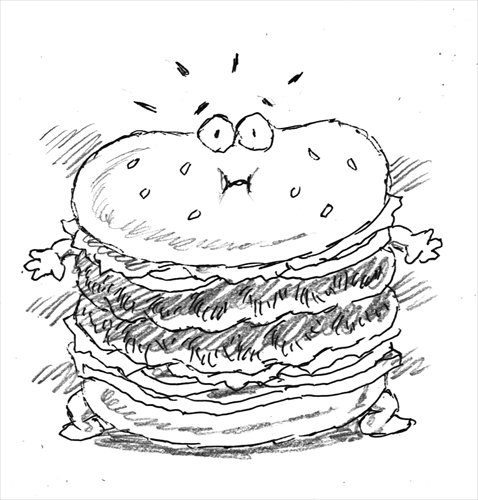Dangers of bad food emerge over time

Illustration: Peter C. Espina/GT
China's struggles with food safety are well-known. The baby formula scandal of 2008 produced nationwide soul-searching after hundreds of infants fell seriously ill or died. There have been periodic seizures of fake meat by police, the most notorious of which, in September 2013, involved the discovery of more than 20,000 kilograms of chemically treated pork which had been made to look like beef. Other scares have ranged from so-called 'gutter oil' (recycled waste oil used for cooking) through tainted dumplings to soy sauce made from human hair.
None of this is good. On the other hand, less well-known in China are the numerous food health scandals that have afflicted Europe and North America in the last few decades. In the 1990s there was the advent of 'mad cow' disease in the UK. During this period hundreds of thousands of cattle had to be slaughtered after it emerged that their brains had been affected by being fed diseased animal parts rather than grass. In 2011 there was an e-coli outbreak in Germany resulting from contaminated vegetables. This followed hard on the heels of the discovery of high levels of the toxic chemical dioxin in eggs from some German farms.
The point here is that food hygiene problems, although obviously occurring much more frequently here, are not unique to China. They are caused by the profit-driven market economic system rather than some imagined moral shortcoming in the Chinese character. Thus there is no need for the Chinese to beat themselves up, or be beaten up, when scandals occur, since these stem from the actions of individuals rather than the nation as a whole. After all, it is not as if there are not also unscrupulous villains in the West who take shortcuts with the public's health in order to increase their income. Greater regulation of food production should reduce the incidence of scandals in coming years.
Probably a more serious issue than short-term scares is the question of the long-term health effects of eating industrially-produced food over a lifetime. In this regard, there is plenty to worry about worldwide, not just in China. In fact, the problems in this sphere are almost certainly greater in the US, which arguably leads the world not just in sophistication of agricultural technology but also in disregard for the consequences of the overall food production process on public health.
One notable result of this neglect is the US obesity epidemic, in large part caused by over-consumption of unsaturated fats, sugar, fructose syrup and salt, which occur in excessive quantities in American food. According to the American Heart Association, 178.6 million people in the US were overweight or obese in 2013, largely due to bad diet. This is a drag on both the US healthcare system and economy, as well as ruining the lives of many of those affected.
If China wishes to avoid having a similar epidemic in the future, it would do well to consider not only short-term food safety but also long-term food quality in its development of industrial agriculture and husbandry, particularly as Chinese people begin to consume ever-larger quantities of Western fast food. Otherwise the wave of American obesity may also become a Chinese public health nightmare in the decades that lie ahead.
This article was published on the Global Times Metropolitan section Two Cents page, a space for reader submissions, including opinion, humor and satire. The ideas expressed are those of the author alone, and do not represent the position of the Global Times.